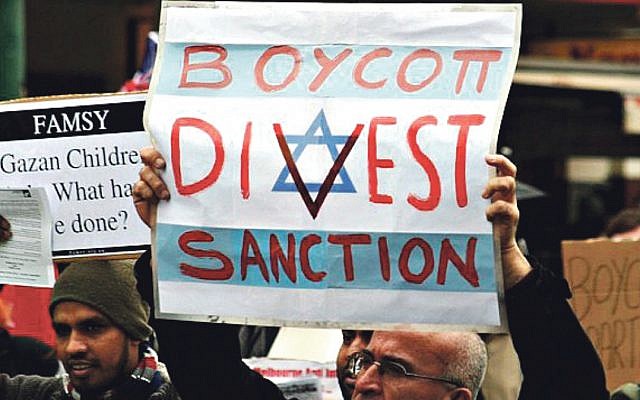OPINION: Laws to stop BDS activity by local councils is essential
MPs must vote to secure government action stopping councils dabbling in Boycotts, Divestment and Sanctions against Israel, writes We Believe in Israel's Luke Akehurst.
Since ‘We Believe in Israel’ was founded in 2011, one of our top priorities has been to combat moves towards BDS (Boycotts, Divestment and Sanctions) in local authorities in the UK.
We launched a local ‘Government Friends of Israel’ network, which more than 700 councillors of all parties have signed up to; we’ve campaigned with a coalition of other organisations successfully against divestment attempts in specific councils like Wirral; and we’ve taken more than 60 councillors on their first visits to Israel as part of our programme of study tours, so they can see the reality of the country for themselves.
But our end objective has been to secure government action to stop councils dabbling in BDS.

This has also been a key priority for the Board of Deputies and Jewish Leadership Council. An initial effort to do this via secondary legislation and guidance was thwarted by a Palestine Solidarity Campaign (PSC) court case, leaving the government no alternative but primary legislation.
We therefore welcome the government’s proposed bill to end the ability of public sector bodies to carry out boycotts and divestment –
We are against BDS more widely, because it deepens the divisions in the Middle East conflict rather than encouraging dialogue and coexistence between Israelis and Palestinians. BDS demonises and delegitimises Israel by reusing a tactic made famous in the superb global campaign to rid South Africa of its racist apartheid* regime to imply, completely falsely, that Israel is morally comparable to apartheid.

We are specifically concerned about councils engaging in BDS because it cuts straight across their duty to promote community cohesion. Taking sides in a divisive foreign policy issue risks importing that conflict into our town halls and potentially onto our streets, to the detriment of good relationships between communities in the UK.
Local Jewish communities, most of the members of which will feel deep connections to Israel, will view their council boycotting or divesting from companies associated with Israel as an attack on their values as a community. It puts people who care about Israel in an invidious position if the council they rely on for education, social services, parks and waste management is taking a very public stance against a country they love.
Because we’ve already done a good job of stopping this phenomenon, we shouldn’t forget how ugly and irrational local government BDS has looked in the recent past. Protesters have stood on town hall steps accusing the contractor Veolia of being “complicit in war crimes” and tried to block it from winning contracts to collect bins, simply because it used to be a minority partner in building the tram network in Jerusalem. West Dunbartonshire Council interpreted its BDS policy as meaning it had to remove books by Israeli authors from its libraries, and a Clackmannanshire councillor refused to meet a constituent at his advice surgery who was a dual British and Israeli national because she was a “citizen of a settler colonialist state” and so had to be boycotted.
We shouldn’t get hung up on defending the right to boycott of a hypothetical rational, pro-two-states set of people pushing BDS as a lever to get Israel to behave better. That isn’t who is behind BDS motions in practice. BDS globally is led by the BDS National Committee, which opposes most dialogue with Israel and practical peacebuilding efforts as unacceptable “normalisation” and is led by Omar Barghouti, who wants a one-state solution. BDS in the UK is promoted by the PSC, which is not committed to a two-state solution.
The government has made clear there will be waivers to allow boycotts of countries like Russia and Belarus that, unlike Israel, do deserve to be shunned by UK public bodies.
It’s a relief that the government has finally listened to years of campaigning on this issue, and I hope all MPs will vote for the new law.
- Luke Akehurst is a Labour party activist. ‘We Believe in Israel’ is a UK grassroots network that believes in the right of the State of Israel to live in peace and security.

Thank you for helping to make Jewish News the leading source of news and opinion for the UK Jewish community. Today we're asking for your invaluable help to continue putting our community first in everything we do.
For as little as £5 a month you can help sustain the vital work we do in celebrating and standing up for Jewish life in Britain.
Jewish News holds our community together and keeps us connected. Like a synagogue, it’s where people turn to feel part of something bigger. It also proudly shows the rest of Britain the vibrancy and rich culture of modern Jewish life.
You can make a quick and easy one-off or monthly contribution of £5, £10, £20 or any other sum you’re comfortable with.
100% of your donation will help us continue celebrating our community, in all its dynamic diversity...
Engaging
Being a community platform means so much more than producing a newspaper and website. One of our proudest roles is media partnering with our invaluable charities to amplify the outstanding work they do to help us all.
Celebrating
There’s no shortage of oys in the world but Jewish News takes every opportunity to celebrate the joys too, through projects like Night of Heroes, 40 Under 40 and other compelling countdowns that make the community kvell with pride.
Pioneering
In the first collaboration between media outlets from different faiths, Jewish News worked with British Muslim TV and Church Times to produce a list of young activists leading the way on interfaith understanding.
Campaigning
Royal Mail issued a stamp honouring Holocaust hero Sir Nicholas Winton after a Jewish News campaign attracted more than 100,000 backers. Jewish Newsalso produces special editions of the paper highlighting pressing issues including mental health and Holocaust remembrance.
Easy access
In an age when news is readily accessible, Jewish News provides high-quality content free online and offline, removing any financial barriers to connecting people.
Voice of our community to wider society
The Jewish News team regularly appears on TV, radio and on the pages of the national press to comment on stories about the Jewish community. Easy access to the paper on the streets of London also means Jewish News provides an invaluable window into the community for the country at large.
We hope you agree all this is worth preserving.






















